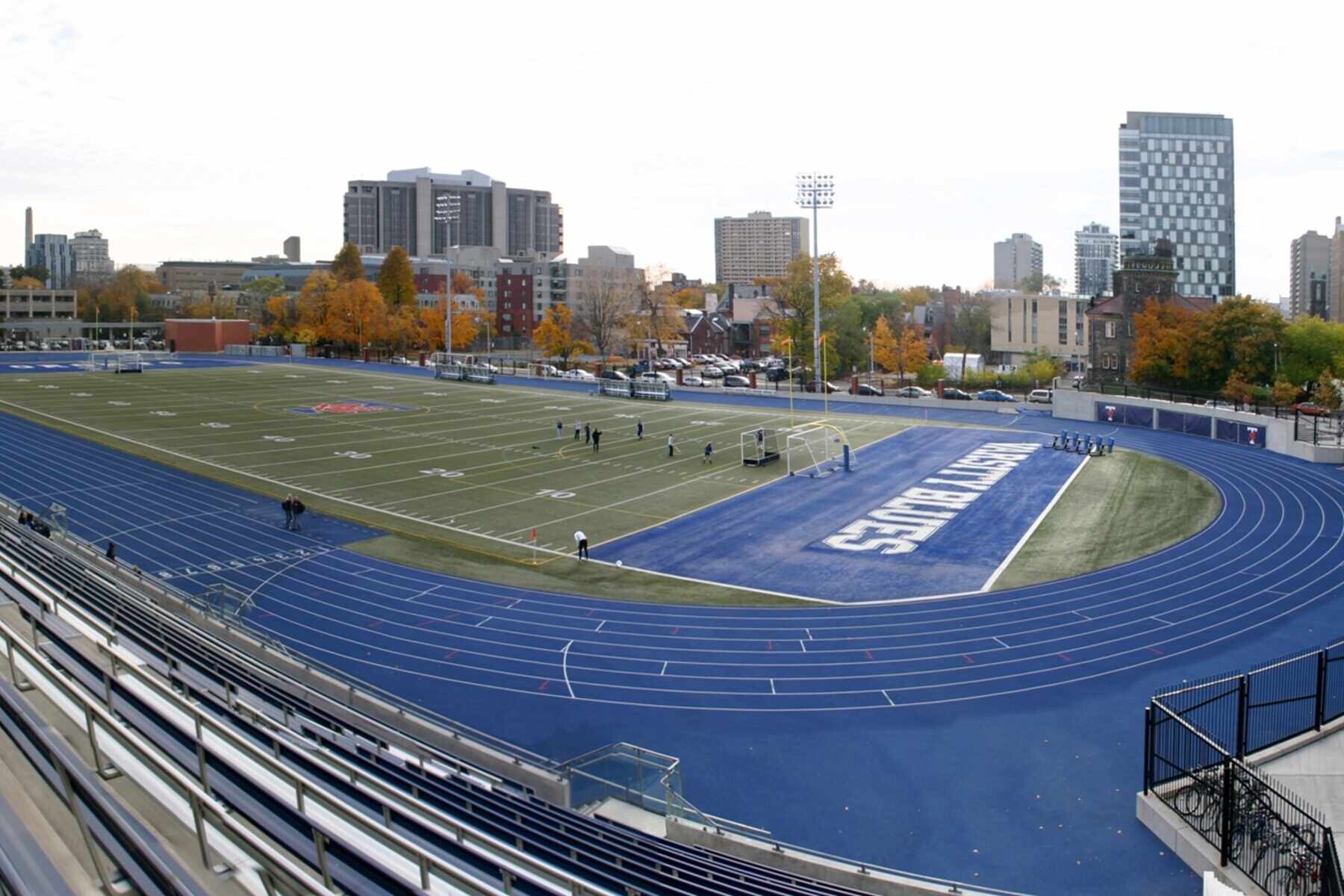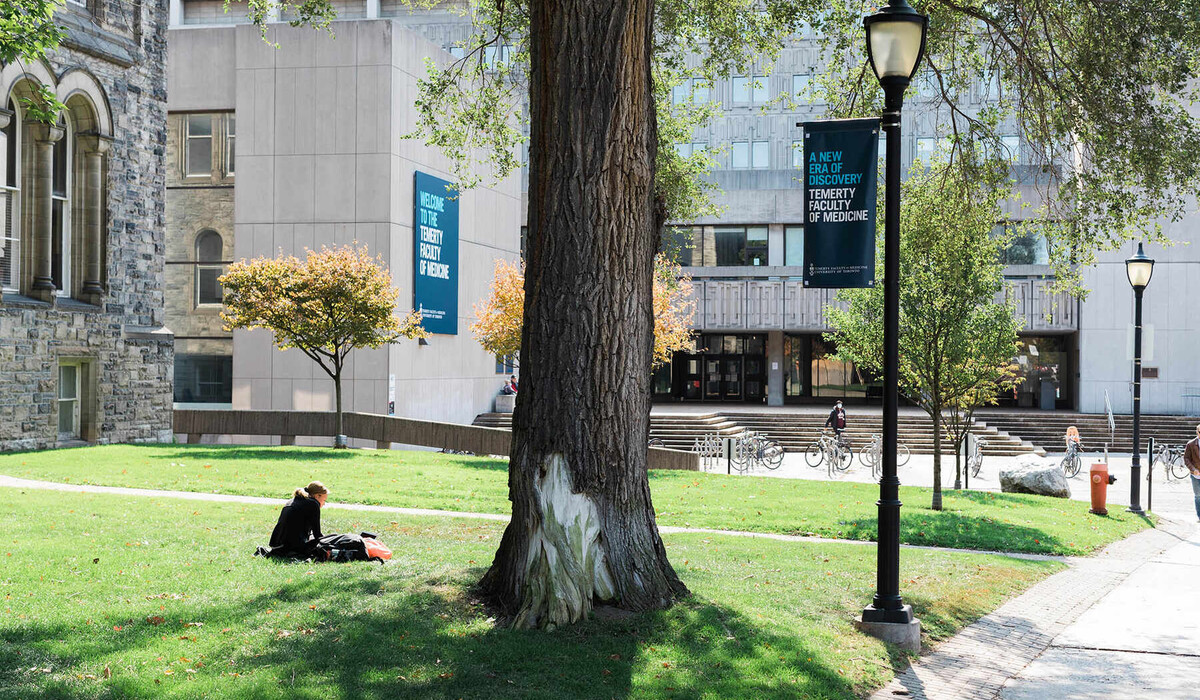As Canada’s largest academic institution, the University of Toronto, established in 1829, hosts more than 600 undergraduate programs, 168 graduate programs, and 42 professional programs. Recognized on an international scale, the research-intensive U of T has an enrolment of more than 70,000 at three campuses and is affiliated with leading research hospitals both in Toronto and across Ontario.
In this section:
Scroll down to see your area of interest.
- Athletics - Athletic facilities, drop-in recreation, and intramural sports.
- Student Services - Various types of workshops, panels, events, collaborative activities, and one-on-one assistance that enhances the learner's mental, social, physical and spiritual wellbeing.
- Learning and Skill Development - Office of Health Professions Student Affairs, writing assistance, and libraries.
- Learner Mistreatment - Find an integrated approach and resources to addressing your concerns here.
- several gymnasia
- an Olympic-sized pool
- an indoor track
- basketball courts
- tennis courts
- a golf cage
- extensive cardio and weight-training equipment
Drop-in recreation classes include:
- yoga
- step class
- pick-up basketball
- pick-up soccer
- pick-up volleyball
- and many more!
Currently classes are offered online.
Intramural sports at U of T involve more than 10,000 students each year, as one of the largest intramural programs in Canada.
For more information about Athletics and Recreation at U of T, visit UT Athletics.
All sports are currently on hold until further notice.

Student Services
The Student Success Centre is located on the main floor of the Koffler Student Services Centre at 214 College Street (on the North West corner of St. George Street and College Street). It's a newly renovated space that is home to Academic Success, Career Exploration & Education (formerly known as the Career Centre) and Housing. For more information on Student Life services, visit their website: www.studentlife.utoronto.ca
There is no shortage of services at U of T designed to make life your life easier. The Office of Student Life organizes several health and support services:
Aboriginal Student Services
The First Nations House provides culturally relevant services to Indigenous learners to support academic success, personal growth, and leadership development.
Why Connect
- Academic support.
- Financial aid and planning.
- Meetings with Elders and traditional teachers.
- Cultural and social events.
Academic Success
Services to help you identify and achieve your learning goals.
Why Connect
- Guide your learning: study strategies, resource library & non-credit course
- Expand your academic skills: workshops & Learning How to Learn series
- Get things done: Study Hubs
- Connect with other grads: Grad Writing & Grad Productivity
- Meet 1:1 with a peer mentor or learning strategist
Accessibility Services
Accessibility Services will assist you in navigating disability-related barriers to academic success for your ongoing or temporary disability. Services and supports for learning, problem solving, and inclusion are available.
Why Connect
- Accessibility remote/online learning updates for students and faculty.
- 5 KEY things to get you started & updated student handbooks.
- Program, practicum, lab & course accommodations.
- Adaptive software & equipment.
- Learning strategies.
- Peer support; learning & social.
- Plus a list of popular accessibility related topics.
Career Exploration & Education
Explore what you can do with your degree, discover job opportunities, and further education.
Why Connect
- Options: Meet employers, industry experts and alumni.
- Strategies: Identify goals and navigate career decisions.
- Resources: Improve your resume, interviews and online presence.
Centre for International Experience resource library
The Centre for International Experience resource library holds links to resources and documents related to immigration, health insurance for international students, living in Toronto and learning abroad scholarships.
Family Care Office
The Family Care Office supports current University of Toronto students, staff, faculty, post-doctoral fellows and their families with any family care related issue. The FCO has always emphasized an inclusive definition of family.
Health and Wellness Centre
The staff at Health & Wellness provide a range of health services for your physical and mental health, wellness programs and information to help support you in achieving you personal and academic goals.
Why Connect
- Appointments with a variety of clinicians & all the health forms you’ll need.
- Mental health support.
- Immunizations.
- Sexual & reproductive health consultations.
- Nutrition counselling & education.
- Skills-building workshops & group therapy.
- Student-led HealthyU Crew.
Housing
Find a great home with the help of U of T's Housing service.
Why Connect
- Rental education resources
- Assistance dealing with landlord & roommate conflicts
- Information on your rights & responsibilities as a tenant
- Residence application assistance, current vacancies & tour schedules
Multi-faith Centre for Spiritual Study and Practice
The Multi-Faith Centre supports the spiritual wellbeing of everyone on campus and provides opportunities for people to learn from each other through interfaith dialogue, arts and social justice.
Why Connect
- Discussions about meaning and purpose.
- Social justice and religious diversity workshops.
- Mindfulness meditation, worship, yoga and other practices.
- Sign up for the Mutli-Faith Centre newsletter.
- Join the Multi-Faith Centre Facebook group.
Learning and Skill Development
U of T’s Office of Health Professions Student Affairs (OHPSA) offers a wide variety of services to students in the Faculty of Medicine in the areas of Wellness, Career Development, Learning Skills and Student Life/Community Outreach.
Join by going in person to the Robarts Research Library and present your University of Toronto registration document. You will be issued with a library photo ID card (T-card).
Your T-card provides access to an extensive collection of online journals, references and books.
The Graduate Centre for Academic Communication (GCAC) offers free, non-credit courses, single-session workshops, and one-on-one assistance throughout the year. While the workshops are open to all members of the U of T community, only registered U of T graduate students are eligible to enroll in the non-credit courses.

Learner Mistreatment
The Department of Radiation Oncology is committed to enabling a positive learning and working environment for everyone in our community. We support an integrated approach to addressing learner concerns that champions the principles articulated in the Temerty Faculty of Medicine guidelines on managing disclosures of learner mistreatment for medical students and PGME trainees (residents and clinical fellows).

